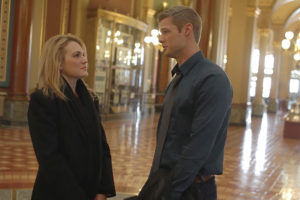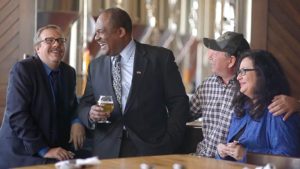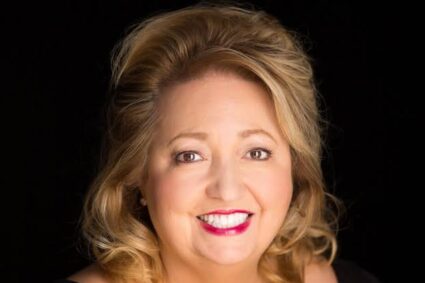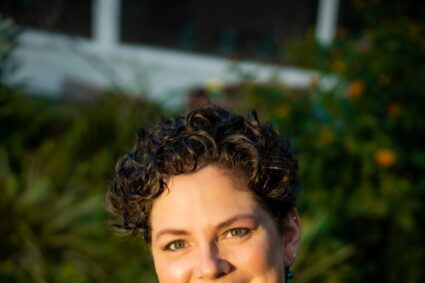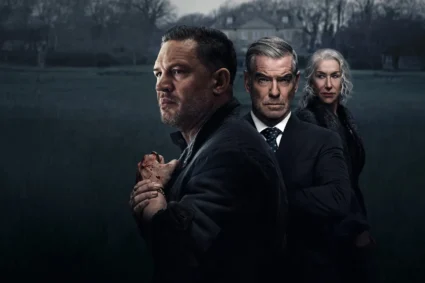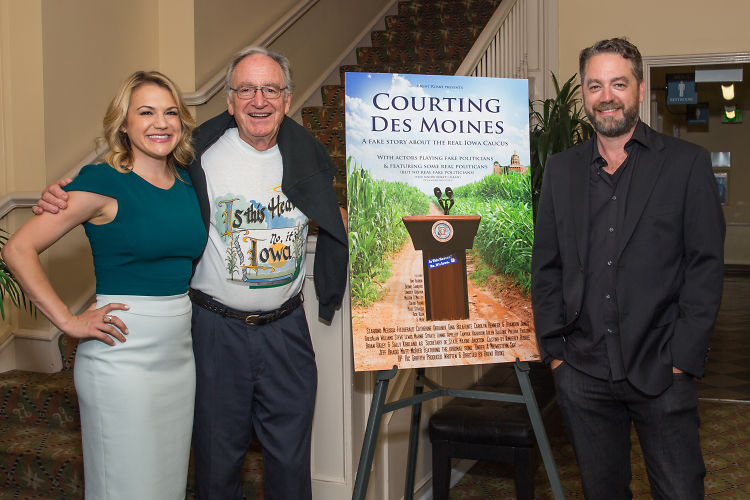
No recent film as capture the heart of politics than the movie Courting Des Moines. A sequel to Brent Roske’s 2012 Chasing the Hill, California Congresswoman Samantha Clemons moves to Des Moines, Iowa to avoid further scrutiny. Her arrival arouses attention from the Des Moines citizens, as “all politics are local and everything local is affected by politics”. After some deep reflection and with a renewed devotion to serve her country, Samantha decides to run for the highest office in the Land, not unlike one-term congressman Abraham Lincoln. Sam hires a young and equally politically passionate Des Moines local, Kelli Brown, to run her Iowa campaign, and together the two women run as the dark horses in a highly competitive and challenging race. I recently talked to Producer, Writer & Director Brent Roske and actress Catherine Urbanek who not only plays Kelli Brown but also serves as the Executive Producer! After seeing this film, I got a good crash course lesson on the Iowa Caucuses
Brent, I am going to start with you. Now, this is the sequel to your 2012 web series Chasing The Hill. What lead you not only to continue the saga of Congresswoman Clemons, but to make it a full-length feature film?
BR: I’ve always been fascinated with the Iowa Caucuses. I had a television show here in Iowa here for awhile. Candidate Bernie Sanders said he believes the Iowa Caucus are the last true bastions of American democracy that we have, and I agree with that. It’s not about slick billboard campaigns or TV campaigns or Facebook ads; it’s getting in a room with friends and neighbors and talking about ideas and seeing which candidate you prefer. To me, its just a fascinating way to do the electoral process, and I wanted to get more involved with it. So, after we finished Chasing the Hill, I had this idea about the winning candidate from that process going on to run for president, so it kind of came from that. I grew up in the mid-West but had lived in Los Angeles for about 17 years, so it’s been fun getting back to the mid-West and I came here to do the movie and I had stayed. And now, I actually work in Presidential Politics here, so it’s been a fun ride.
It sounds like a fun ride, indeed. So, for those who are not familiar with Courting Des Moines, tell us about the story.
BR: So, Courting Des Moines is interesting because what it does is it illustrates how a potential small group of people with limited funds can actually run for president and be a viable candidate. The story line, as you mentioned right away in the beginning, you find out that Congresswoman Clemons has resigned her seat in the U.S. House of Representatives and finds herself in Iowa, literally kind of holed up, if you will, in a family house that they have, and she’s kind of figuring out what her next steps are going to be and she decides, almost in spite of the party, to run for president. And Iowa—the Caucus process and campaigning for the Iowa Caucuses is really about small groups. It’s about ice cream socials; it’s about county democrat meetings. It’s really been interesting. We—I work on one of the campaigns of the Iowa chair for one of the presidential campaigns right now, and some of the same locations we filmed scenes in the movie for I have been a surrogate speaker for our campaign ad as well. So, it’s really been fun to see art imitate life and vice versa, and really see how the one on one communication between Iowans really go to help to decide the next president of the United States.
Like religion, football is to Texas, the Caucuses are to Iowa.
BR: (laughs) That’s exactly right. Iowans take the responsibility very seriously, and the Iowa Caucuses certainly help decide who the nominee will be, but it also does a good job of dwindling the field, so Iowans understand that and Iowans are appreciative of their position to meet the candidate and I think Iowans do a really good job at staying educated and giving them the tough questions, see who can move on to New Hampshire and the rest of the states.
Absolutely. Catherine, I want you to talk to us about your character, Kelli Brown and how did you prep to playing her?
CU: Well, Kelli is an attorney who is asked to become the manager for Samantha’s Iowa campaign, and interestingly enough, I feel like I’m doing prep in reverse, because I’m currently in law school.
CU: I think I read his book. I think Brent recommended it to me.Was it Game Change?
BR: Yeah.
CU: Yeah, I read the book Game Change, about the—was it the 2012 election? Right?
Yep.
BR: I think that would have been Obama’s first run, so 2008.
CU: 2008. So, I read Game Change about the 2008 election. That was pretty much my prep for going in to this movie. But yeah, Game Change was very eye opening, for sure.
Not only you acted in the film, you also were the associate producer of the film. Was it difficult being the associate producer as well as acting in this film?
CU: No, I really like producing. I started producing after maybe a year or two after I got out of undergraduate. I like bringing people together and working on a project and collaborating and I think Brent also says a producer is someone who gets stuff done. I enjoy that aspect, and it didn’t really interfere with acting in the film. I think, probably being an associate producer made it more fun.
That’s great to hear. Now, through the fictional story line, Brent, we get to see real footage of the 2016 presidential candidates like Hilary Clinton, Donald Trump and more. Why was this type of footage included in this film?
BR: So, the real candidates. That footage is from my television show, and I just thought Chasing the Hill had a lot of weaving between that reality, fiction, and to me it just—I watched Chasing the Hill again recently. It’s so interesting how we’ll have a “real energy” with the former governor, Ed Rendell, who plays the president in Courting Des Moines, and then he’s talking about the challenges you face being mayor or governor, how it’s a real strain on family, how you have to have a real supportive team. And then ten minutes later, he’s in a fictional scene with say, Melissa Fitzgerald. So, to me that—I think it just bring to the scene, and this whole project—genesis of it—was talking about the price that is paid by people who want to run for office but then hold office, and of course, you always hear about the folks engaged in not good activities because it makes for interesting news, but Gov. Gray Davis said in the first part that most people in his experience go into this to do the right thing, and in fact do the right thing. It just doesn’t make interesting news and you don’t hear about it very often. I just thought that was an interesting place to come from, and that really entwines the whole projects.
Absolutely, especially considering this is perfect timing now that it’s being released on Amazon, considering that we have the presidential election coming up next year. This question is directed to the both of you. Why do you feel we need to pay attention to the Iowa Caucuses? Since you know, I’m from the D.C. area, so it’s normal for me to follow politics I’m right at the center of the political world. But for the rest of the country, why do you feel we need to pay attention to Iowa?
BR: I think Iowa, it’s one of the—it’s between Iowa and New Hampshire, right? So, Iowa is first, and New Hampshire is the primary that happens just a few days following. Iowa Caucus will be February 3rd this year, and what it does is it gives a candidate at least a possibility of being involved in the process if they’re not individually wealthy or they’ve got backers, etc., it does provide a pathway for just straight messaging and just the real power of communication to come across. What’s interesting about this year with so many candidates and the DNC scrolls’ sort of debate threshold there is a bit of the nationalization of the primary process, which definitely puts the Iowa Caucuses not necessarily in jeopardy, but it definitely takes away some of the power of the Caucuses, because you’ve got the social media primary, which is who’s getting the most followers/donations, but with the thresholds for the debate, when you have to rely on different polls around the country and 130 donors from around the country, twenty different states, two hundred donors at least, you definitely have to have more of a nation wide campaign, or at least key states. So, the Iowa Caucus is still very important, it will remain very important, but this year in particular, it’s got a little less power than it used to, but really the chance for Iowa to win for candidates down to Vice President Biden all the way down to John Delaney, all the way down to the other candidates. They really do have to show up, do the work and spend time in rooms as small as ten people up to several thousand. So, you’ve just got to work to show up.
How about your take, Catherine?
CU: I would say for me, one thing I found interesting about this film—I was telling Brent this earlier—a friend of mine who was a political science major at Carnegie Melon watched the film, and he had no idea how the Iowa Caucus process worked, and what I think is interesting is it was a learning process for me, because I honestly didn’t know what a Caucus was when I started on this film. So, I think what’s really interesting for me is right now, I—especially with the election coming up—
It’s kind of in a way where the race for the president officially kicks off. And, I think what’s also really interesting about it is somebody who lives in Los Angeles—which is a really a metropolitan place, obviously—and a lot of these candidates are from big cities having to go into Des Moines, IA, where I feel like it, as one of the characters in the movie, it’s the green belt. And kind of coming out of their element and interacting with this big part of America, and really the way—I think it kind of cut through a lot of talking points and B.S., because people have to interact one on one with, as Brent said, a room as small as ten people. You’re not on a debate stage at a CNN Town Hall. If you are in a small room in the back of a convention center with eight or nine people possibly, you have to be real and you have to be direct, you have to be honest and you have to be yourself. In that way, I think it really is kind of one of the most intimate election processes that we have. And yeah, especially for anybody who is American, it shows a really interesting window into where the race for the most powerful office in our country really starts.
Absolutely. Being a Washingtonian and watching this film, I’ve really gotten an eye opener of the Iowa Caucus that I never knew before. Now, I’m going to go to you, Catherine. Since you worked with Melissa Fitzgerald who played Congresswoman Clemons, talk to us about that chemistry that you two showed on the film working together?
CU: Well, I really liked Melissa personally, so that helped. And she’s a veteran in the world of film and television, so it was exciting for me to work with her. And she’s really good at what she does, so as an actor, that’s kind of a lot right there to act with somebody who’s good. She’s also humble, she’s a game player—or team player rather—I think working with her is almost effortless, because she’s prepared, she’s ready, and she’s great. So, working with her was just a real pleasure.
Excellent. Now Brent, I understand this film was made back in 2016 and this is the sequel. Are we looking at a third possible film for the 2020 season coming up?
BR: (laughs) I love making movies, and should this one find an audience like Chasing the Hill did, I am happy to make another one. I think the story line definitely wanted to talk to it, obviously some of the feed back we’ve gotten from the film—of course, it’s on Amazon now—but we had done screenings of it and some of the feedback was in a “post-Trump world, does this film still have relevance?” And I think it’s a very good-natured film. I think it’s still a positive take on American politics, and it’s not necessarily that it’s a realistic film for today and that everyone is so excited about an opportunity to cut someone down in politics to make sure they get come out on top regardless of cost of all things. It’s—does it really approach politics that way? So, maybe it inspires people to look at things a little bit differently, and I think that’s a valuable thing to do as well, so I’m always happy to entertain a conversation about making a sequel, or ten sequels. I’d love to keep making these types of films. They’re very enjoyable. People, go to Amazon, check out the movie. And then what’s interesting—
We filmed at the Iowa State Capitol, in the building the last time there was a show was shot there, all the way back—Normal Lear did a film back in the ’70’s. That was the last time an actual film had taken place there. We filmed in the rotunda. We filmed in the Iowa State Capitol Library as well as, like I mentioned, all these Chair buildings, county democrat chair buildings. If you are interested in Iowa Caucus process, check it out, and you’ll also see we recreated Caucus night, and you’ll see fifty people in a room performing a scripted—but you’ll get an idea of what it would be like to attend an Iowa Caucus. I know for me, it was something I was personally curious about, so if your listeners are interested in presidential politics in general, the Iowa Caucus’s track record is incredible. I think four of the five nominees won the Iowa Caucuses. It’s a pretty impressive number, because it’s not just the fact that they won Caucuses, but the deluge of national press that you get should you do well in this race helps. The other races, Super Tuesday following South Carolina and Nevada, so it’s really the first gauge you’ve got to clear, so if you’re interested in presidential politics, a good background story
That is true indeed. Now, another question I have, Brad. How did Iowans feel about you making this film? We’re they skeptical at first, or did they say they were all in, “what can we do? How can we help?”
I hadn’t lived in Iowa very long when we started filming. I want to say I was here, maybe nine or ten months before we hatched this and it wasn’t a ton of time for people to get too comfortable, but I did get to make some key relationships. And fortunately, a lot of people had seen Chasing the Hill, or when they heard what I wanted to do, they were able to do that, take a look and and see that we had definitely gotten a lot of coverage for that project. Also, when I first got to Des Moines, I wrote a play about Abraham Lincoln, and we actually performed it in the House of Representatives’ Chambers in the State Capitol building. And a lot of folks in Iowa media and Iowa politics actually attended and heard about that, so I kind of got inroads with the community that way. So, when we were looking to do the film, one of the scenes—I think the second or third scene in the movie—Catherine is a quick little run in the Iowa Caucus precinct across the state—there are 1,677 Caucus precincts on the night of February 3rd.
And she is teaching a class on how people should do that, and all those people—they were volunteer extras in the film, and we had 40 people for that. We had sixty people for different scenes where they meet the candidates and in the Caucus, maybe forty or fifty people for that. And it was just really a nice community that came out, and when we did a screening of the film, when we finished it—we did a screening of it here in Des Moines, and it was packed. There was a line around the block to get it, because it’s one of the few films of note that have been filmed entirely in Des Moines, and with almost an Iowa packed cast. Chasing the Hill, obviously has a lot of Los Angeles actors; Richard Schiff, who played Toby on The West Wing; Robin Weigert, who played Calamity Jane on Deadwood. But this sequel—Melissa Fitzgerald, who was also on The West Wing—she’s the lead. Catherine’s in it, Ed Rendell and some other folks, but mostly I wanted to use Iowans. They’re definitely Iowan actors here, a lot of theater actors, etc. It was fun to kind of use the real folks who actually participate in the Caucus process who just happen to have artistic backgrounds to be in the film. So, it was a lot of fun.
That is brilliant. I’m glad to hear it. One final question. After making this film, did it change the way you see politics. This is to the both of you. I’m going to talk to you first, Catherine.
CU: I would say in a way it did, in the sense that what my impression was Des Moines was it was people that could have different ideas and could have different political backgrounds; that they could sit down together in the same room and have a drink and discuss the politics. And it kind of, I think if we shot it right before or right around the 2016 election, I think things have gotten very hostile. It’s very hard now to have a conversation with somebody who is on the opposite side of the aisle.
Right.
It doesn’t have a conversation. It goes quickly into an assumption that you are something. “Why should I talk to you? You’re a horrible person or you believe this,” or whatever. What I thought was really interesting about learning about the history of Des Moines was this is America, and Americans predominantly fall one one side or the other. Everybody wants the country to do well; everybody wants the country to succeed. One side just has a different idea of how to go about it than the other does, and you can have a conversation and a discourse and a healthy debate, and still be friends at the end of the day. To me, it kind of made me a little nostalgic for hopefully a time that America can go back to where we can have discussion, where can have an open dialogue without people immediately going at each other’s throats about things. Because again, at the end of the day, we are all Americans who love our country; we all want the same things. It’s just we have different ideas about how to get there.
So for me, it showed a side of American politics that I’m not really used to seeing, and that there’s a civility in Des Moines that I appreciate and also just a very strong patriotism being there in Des Moines. Everybody knows about the ins and outs of election, but they’re concerned about local politics, national politics. The knowledge that everyone there has about this country and about the major players in this country, which is really inspiring to me, and I thought, “wow! I don’t know nearly as much as everybody in Des Moines does,” so it was also just the love of America that I thought that Des Moines really refreshing and eye opening, and I also loved shooting there. I would love to shoot another film in Des Moines. It was a wonderful experience. Everyone was so helpful and kind and enthusiastic. But it did make me want to be more politically aware; not just in terms of candidates but also how does our country—democratic, republic—work? And the Iowa Caucuses are a huge part of that, so.. it was very educational and inspiring.
Amazing. I do agree with you, especially that’s one thing I do miss about politics the last few years, compared to the rest of the years in my lifetime is the civility. I definitely agree with you 100%. And how about you Brent, to rap it up?
BR: Catherine touched on something that I found to be true as well. Iowans really do get involved and for the most part really do stay quite civil. What you may not realize is that in Iowa, if you are an engaged activist in either party, you can absolutely have well-known candidates come to your house, meet with your friends and family, and have an hour or two salon in your living room with 20 people and someone who may very well be the most powerful person on the planet, and that interaction—I’ve heard a candidate say, “if you’re not interested that a stranger is coming up to you and telling you that their aunt just went into a hospital; if you are not interested in that, you should not run for politics.”
BR: Some of the other cities—Los Angeles, in particular—they call it “parachute politics.” They leave the private jet, they attend the fundraiser, they’re there for a half hour, all you see is them wave from the SUV after they collect their big checks; but Iowa and New Hampshire, that’s just not the way it is. The retail politics, the handshake to handshake, person to person. I think that has value. I think it’s basically that one of democracy’s last secret weapons as far as trying to keep some semblance of “message over money” and the value of the process, so there are still—I work for the John Delaney campaign here in Iowa, and the civility we talk about in the film has been refreshing to see expressed on the front line and the idea of bringing a country back together and, this isn’t even a criticism of the current administration, but really just that being the intent and the goal of say, even the John Delany team is really to try and find the common ground where the messaging overlaps with party, without party, etc. So, it’s been fun to find pockets of that and a receptive audience, not only to the film, but our activities or real politics. I was grateful to have a chance to make Chasing The Hill and of course, Courting Des Moines, and I invite everybody to check it out on amazing.com. Leave a good review if you love, and if you don’t love it, don’t leave a review.
DR, CU & BR: (laugh)
BR: I’m always grateful for people to watch the film, reach out, let us know what you thought of it, and thanks for having me and Catherine on the show to talk about it.
Well, we thank you, especially being a Washingtonian, being near politics at the heart. It’s a great eye-opener to learn something new about the Caucuses, which I never learned before, and I thank you for bringing us closer to learning more about the Iowa Caucus, so Catherine and Brent, thank you so much for taking time out of your busy schedules to talk to us and we’re looking forward to seeing this film on Amazon.
“Courting Des Moines” is now streaming on AMAZON PRIME VIDEO! Check it out before our next Presidential Election!
